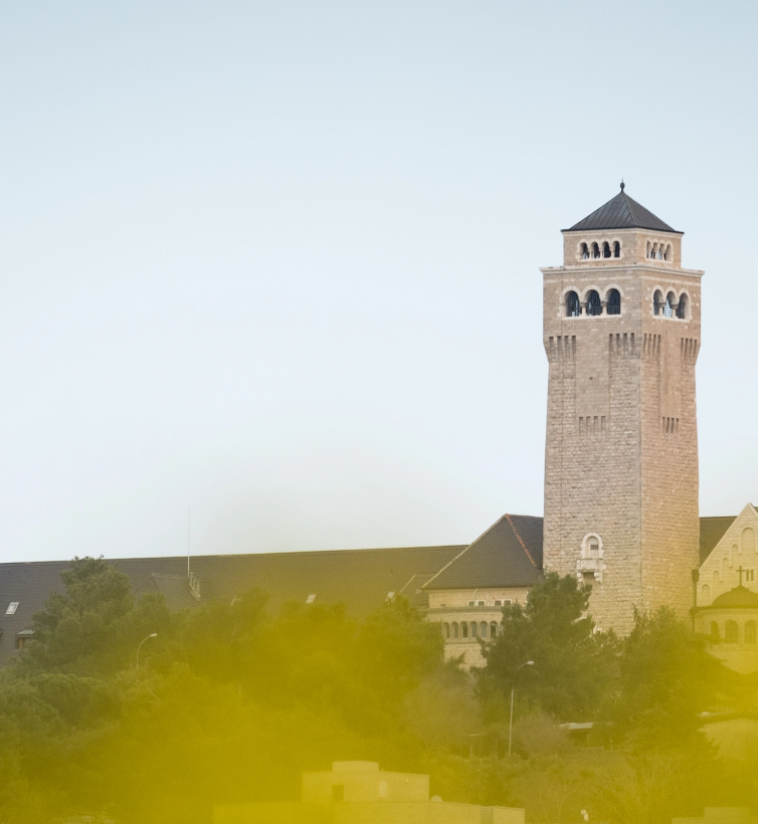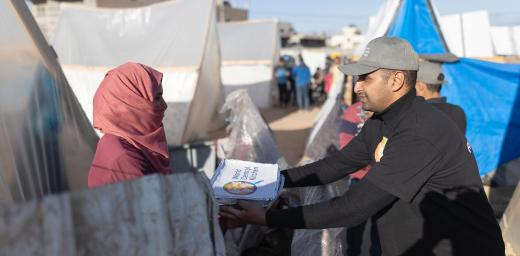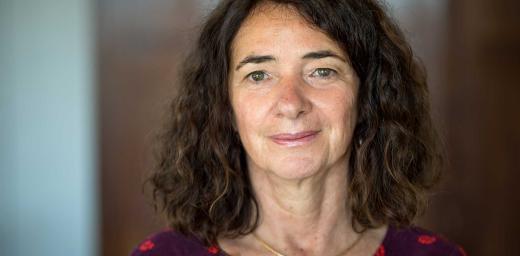Augusta Victoria Hospital (AVH) is a center of medical excellence in East Jerusalem, serving all 5 million Palestinians in the West Bank and Gaza. AVH has the following care centers and departments: The comprehensive Cancer Care Center, the Hematology and Bone Marrow Transplantation Center, the Kidney Care Center, specialized cancer surgery, the Specialized Centre for Child Care, the Skilled Nursing and Long-Term Care Facility, the Laboratory Medicine Department and the Diagnostic Radiology Department. AVH has an active community outreach to marginalized areas in the West Bank. In addition, the hospital is considered the leader of the Anti-Microbial Stewardship Initiative in the West Bank which aims to control infections in hospitals and to combat the resistance against anti-biotics due to overusage.
Augusta Victoria Hospital is accredited by the Joint Commission International for its outstanding quality. Over 90% of the patients currently treated at AVH are referred by the Ministry of Health of the Palestinian Authority and around 40% come from Gaza. AVH delivers all these aspects of care to around 7000 patients annually.
AVH Community Outreach Program
Augusta Victoria Hospital has established unique community-based diabetes and breast cancer screening programs to address the huge national needs for high quality and comprehensive services within the Palestinian healthcare system. The programs embody the values, ethics, and moral commitments of the LWF/AVH toward the rights of the poor and the oppressed. Access to high quality, affordable, and dignified healthcare as a basic human right.
AVH Mobile Diabetes Clinic
The AVH diabetes team helps patients with the adoption of a healthier lifestyle, including physical activity and exercise, nutrition, weight control and smoking cessation.
AVH Mobile Mammography Clinic
Since 2009, the LWF has been providing a community-based breast cancer-screening program to support the preventive, screening, and curative services related to breast cancer in Palestine. The program assists women living in rural villages, refugee camps and areas where the needed services are not available. The mobile program helps to ensure better access by providing the services closer to home.
Palliative Care
The construction of the planned Palliative Care Center on campus is planned to be completed by 2024.
Access to health
Children from Gaza with cancer needing immediate referral and treatment in the Augusta Victoria Hospital experience long delays in obtaining the necessary Israeli permits and must reapply for each treatment session. Parents of Palestinian children with cancer also experienced delays and rejections in obtaining permits to accompany them for treatment. The effect of the separation is both physically and emotionally harmful and has a negative impact on the healing process and life expectancy of the child. The team of AVH advocates for the immediate treatment of children with cancer and for the permit of a first degree relative.
The Vocational Training Program (VTP), one of the LWF-Jerusalem’s oldest projects, has been providing vocational training to Palestinian youth since 1949. Originally, three-year training programs were offered in carpentry, auto-mechanics, and metalwork. The Lutheran Trade School was renamed the Vocational Training Center, and in 1964 the Center moved from the Augusta Victoria Campus to a new and larger facility just to the north of Jerusalem in Beit Hanina. In 2000, VTC Beit Hanina became a co-ed institution and began enrolling women in the profession of telecommunications
The Vocational Training Program expanded in 2004, establishing the Vocational Training Center in Ramallah (VTCR) to ease access for trainees from the West Bank. In 2012, three new departments were opened: catering and craftwork departments in Beit Hanina and a vocational secretary department at the VTCR, significantly increasing the outreach to women. In 2021, a major new chapter in the history of the VTP started, as the Vocational Training Centre Ramallah was inaugurated. The center centralizes all VTC activities in the old School of Hope belonging to the Evangelical Lutheran Church in Jordan and the Holy Land, and work is still ongoing to convert the school into an innovative and inclusive VTC.
LWF Jerusalem is responding to the need for affordable housing for Palestinian Christians by planning to build between 40 and 50 apartments on LWF land in Beit Hanina, Jerusalem.
In line with its country strategy, LWF Jerusalem has developed a long-term ecological environmental conversion plan for the AVH hospital and the LWF campus in the field of environmentally friendly technology, to reduce greenhouse emissions such as a solar power generating systems, replacing fuel with cleaner energy, landscaping, waste and water management, greening the campus and environmental awareness programs.
As a major Christian presence on the Mount of Olives, LWF promotes justice, peace, and reconciliation between Israelis and Palestinians through advocacy, humanitarian, and development programs. The LWF Jerusalem Program aligns itself with the UN International Human Rights instruments and International Humanitarian Law, as well as with Security Council resolution 242 (1967), in condemning the Israeli occupation of Palestinian Territories.
The LWF sees the continuous occupation as a source of human rights violations and an obstacle for peace and justice. Within this period, the LWF Jerusalem Program will reinforce its work on human rights - with particular emphasis on access to health for children from Gaza - gender justice and inclusion, while strengthening equitable access to livelihoods, quality services, protection, and social cohesion.
In the current crisis, LWF has issued several statements condemning the violence on both sides and called for a release of hostages, for a ceasefire, and for humanitarian access to support the civilian population in Gaza.
In the wake of World War II, the work of German-run missionary associations, including the Kaiserin Augusta Victoria Stiftung, were transferred to the care of non-German organizations. The LWF became the owner of the Augusta Victoria property in 1950 and began managing Augusta Victoria Hospital at that time. LWF Jerusalem was one of the first projects of the Lutheran World Federation newly established Department World Service.
Already in 1948, when the Arab-Israeli war broke out, the LWF quickly responded to the needs of Palestinian refugees by providing food and medicine, opening clinics, and establishing milk and feeding centers and a clothing distribution center. In 1950, on the Mount of Olives campus in East Jerusalem, LWF Jerusalem began its administration of Augusta Victoria Hospital (AVH), a medical center that has evolved over the years and is now a center of excellence specialized in oncology and nephrology. Since 1949, LWF has managed a VTP with campuses located in the Jerusalem municipality (originally on the Mount of Olives campus and, as of 1964, in Beit Hanina, East Jerusalem) and in Ramallah, as well as outreach programs throughout the West Bank. The main pillars of the program have remained the same throughout the last 75 years, albeit with continuous innovation and progress at multiple levels.








